I’m not certain what the hell was going on here, but it sure was well done.
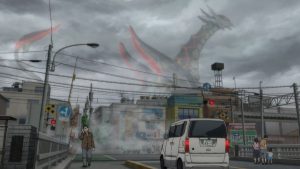 I’m still not convinced that all the story elements are going to pay off with SSSS.Gridman, but the truth of it is that matters less and less the closer we get to the end. There are a lot of series for which the ending is truly critical, but I believe that’s less so with Gridman. That may sound contradictory but in truth, when a show can ask this many interesting questions in such a fabulously creative and stylish way, it’s not the end of the world (no pun intended) if the answers aren’t wholly satisfying. For me, this series is more the journey than the destination.
I’m still not convinced that all the story elements are going to pay off with SSSS.Gridman, but the truth of it is that matters less and less the closer we get to the end. There are a lot of series for which the ending is truly critical, but I believe that’s less so with Gridman. That may sound contradictory but in truth, when a show can ask this many interesting questions in such a fabulously creative and stylish way, it’s not the end of the world (no pun intended) if the answers aren’t wholly satisfying. For me, this series is more the journey than the destination.
 Gridman is a fascinating mix of elements, and that’s no doubt one of its strengths. It’s not a tokusatsu, kaijuu or mecha show, it’s not Trigger (though it literally is of course), it’s not Gainax – but it has elements of all those things. It truly feels as if this may be the first series – Trigger or otherwise – to evolve the Gainax model to a new form, something that builds on it but establishes itself as something fresh and new. Amemiya Akira is not someone who was prominent on my radar, but he will be now – he’s a formidable talent, and the team he’s put together for Gridman has done a truly fantastic job on the production side.
Gridman is a fascinating mix of elements, and that’s no doubt one of its strengths. It’s not a tokusatsu, kaijuu or mecha show, it’s not Trigger (though it literally is of course), it’s not Gainax – but it has elements of all those things. It truly feels as if this may be the first series – Trigger or otherwise – to evolve the Gainax model to a new form, something that builds on it but establishes itself as something fresh and new. Amemiya Akira is not someone who was prominent on my radar, but he will be now – he’s a formidable talent, and the team he’s put together for Gridman has done a truly fantastic job on the production side.
 This episode, like much of the series, had a strong sense of Anno Hideaki about it. Whatever else happened the final episodes were surely going to revolve around Akane one way or another, but the turn taken here was surprising in some ways – less so in terms of plot than execution. As to the former it’s hard to judge because it’s dangerous to think we know exactly what we were watching, but to take the narrative track of showing Yuuta, Shou and Rikka in three independent Akane-fueled dreams was a master stroke. But it was full of riddles, even so.
This episode, like much of the series, had a strong sense of Anno Hideaki about it. Whatever else happened the final episodes were surely going to revolve around Akane one way or another, but the turn taken here was surprising in some ways – less so in terms of plot than execution. As to the former it’s hard to judge because it’s dangerous to think we know exactly what we were watching, but to take the narrative track of showing Yuuta, Shou and Rikka in three independent Akane-fueled dreams was a master stroke. But it was full of riddles, even so.
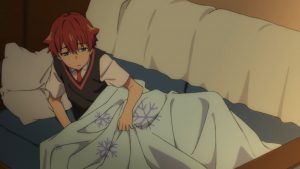 In broad terms, it still feels as if we’re in some sort of virtual simulation created by Akane. But I still struggle to accept that the three protagonists are simple NPCs – most especially Yuuta, but not only him. Would NPCs have the ability to rouse themselves from a dream because they recognized that something was off? Maybe – we don’t know the rules here. But if Akane is indeed the God she claims to be, why can’t she (ever) make anything in her creation bend to her will? “Even in dreams I can’t reach them” is a plaintive cry indeed, but it isn’t one that speaks of omnipotence.
In broad terms, it still feels as if we’re in some sort of virtual simulation created by Akane. But I still struggle to accept that the three protagonists are simple NPCs – most especially Yuuta, but not only him. Would NPCs have the ability to rouse themselves from a dream because they recognized that something was off? Maybe – we don’t know the rules here. But if Akane is indeed the God she claims to be, why can’t she (ever) make anything in her creation bend to her will? “Even in dreams I can’t reach them” is a plaintive cry indeed, but it isn’t one that speaks of omnipotence.
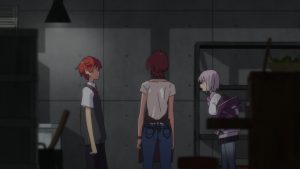 Having repeatedly failed to subdue Gridman in battle, it seems Akane has attempted to do so through more subtle means. That she’s able to force the main trio to enter a dream world of her creation does suggest Godlike powers, but the fact is, they have free will and they keep exerting it. It also seems as if Gridman was quite intentionally trying to break through and communicate with Yuuta, to draw him back to “reality” (whatever that is). Just who and what Yuuta is remains one of the towering enigmas at the heart of this plot, though it certainly has a lot of company.
Having repeatedly failed to subdue Gridman in battle, it seems Akane has attempted to do so through more subtle means. That she’s able to force the main trio to enter a dream world of her creation does suggest Godlike powers, but the fact is, they have free will and they keep exerting it. It also seems as if Gridman was quite intentionally trying to break through and communicate with Yuuta, to draw him back to “reality” (whatever that is). Just who and what Yuuta is remains one of the towering enigmas at the heart of this plot, though it certainly has a lot of company.
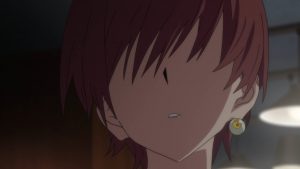 There were so many visual highlights from these three dreams that it’s hard to know where to start the praise. Especially beautiful to me was the way Yuuta’s face was reflected in the Tonkawa family grave marker, with the Kanji for “river” appearing as tears on his face. Akane and Shou’s trip to Nakano Broadway (“Sevendarake” indeed). The way Gridman’s face kept appearing – in reflections, on giant TV monitors. The full bus (for a change) becoming the usual empty one when Rikka hit the “stop request” button (which was itself a gorgeous metaphor). And I loved the use of the “God Zenon” form of the Junior High squad, as they fought Akane’s newest kaijuu (which seems to have been critical in generating the dream state for the SSSS) without Gridman’s help.
There were so many visual highlights from these three dreams that it’s hard to know where to start the praise. Especially beautiful to me was the way Yuuta’s face was reflected in the Tonkawa family grave marker, with the Kanji for “river” appearing as tears on his face. Akane and Shou’s trip to Nakano Broadway (“Sevendarake” indeed). The way Gridman’s face kept appearing – in reflections, on giant TV monitors. The full bus (for a change) becoming the usual empty one when Rikka hit the “stop request” button (which was itself a gorgeous metaphor). And I loved the use of the “God Zenon” form of the Junior High squad, as they fought Akane’s newest kaijuu (which seems to have been critical in generating the dream state for the SSSS) without Gridman’s help.
 Now we wait and see what Rikka is about to say to her fellow squad members – though it seems very possible that she’s figured out what’s going on here, at least to an extent. Gridman’s statement that Akane needs to be woken from her dream seems to set up the finale arc, and this is one of those elements I’m not sure is going to pay off – I still don’t buy redemption for her, as I see nothing that makes me think she deserves it. But it nevertheless asks those interesting questions – most pressing, perhaps, what happens to Yuuta, Rikka and Shou when Akane wakes up? That depends on what they are, I suppose – and SSSS.Gridman wasn’t quite ready to tell us that just yet.
Now we wait and see what Rikka is about to say to her fellow squad members – though it seems very possible that she’s figured out what’s going on here, at least to an extent. Gridman’s statement that Akane needs to be woken from her dream seems to set up the finale arc, and this is one of those elements I’m not sure is going to pay off – I still don’t buy redemption for her, as I see nothing that makes me think she deserves it. But it nevertheless asks those interesting questions – most pressing, perhaps, what happens to Yuuta, Rikka and Shou when Akane wakes up? That depends on what they are, I suppose – and SSSS.Gridman wasn’t quite ready to tell us that just yet.




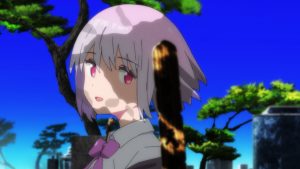
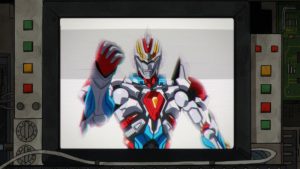
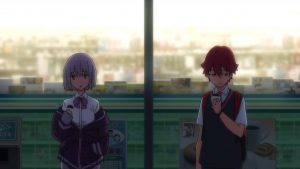
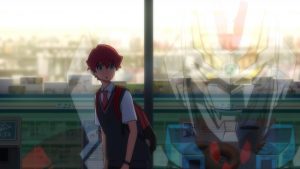




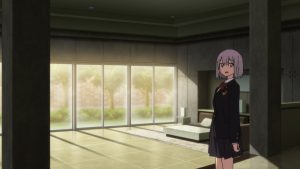
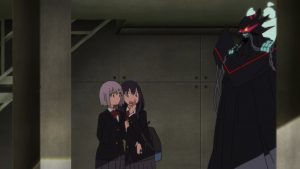


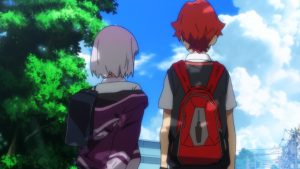
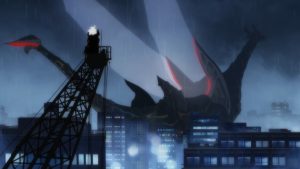
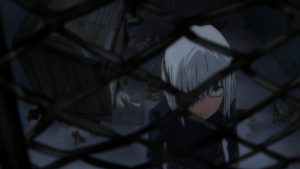


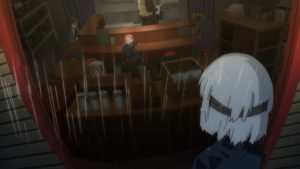
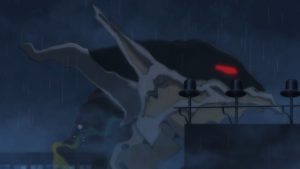
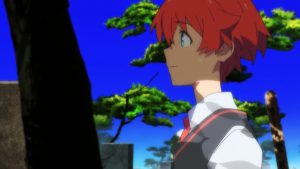

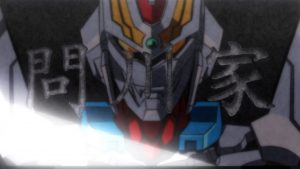
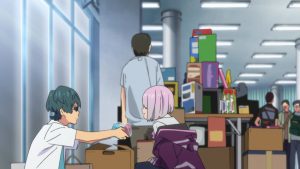
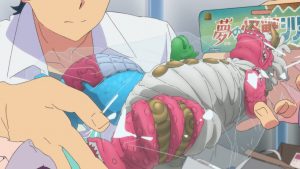

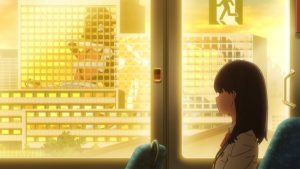

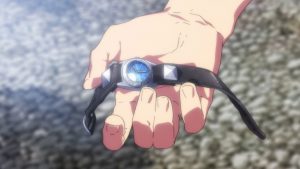

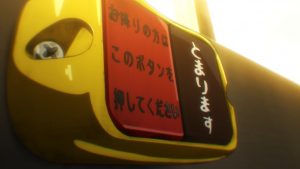
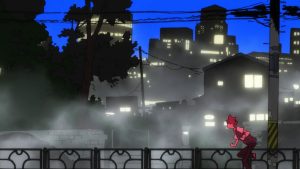

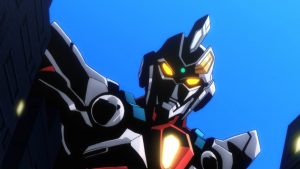
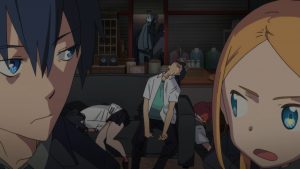

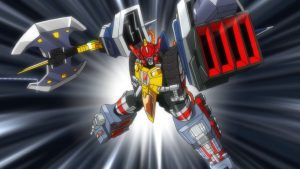
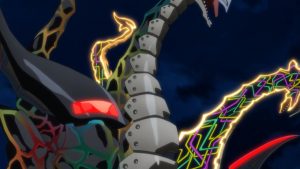
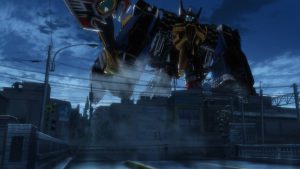
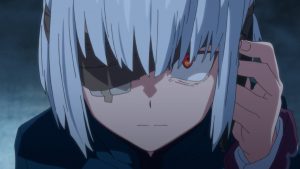
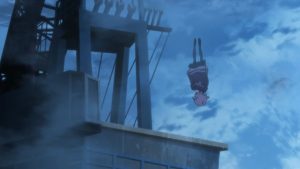
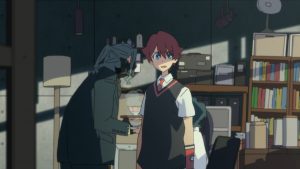
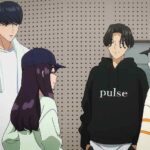

Ngai
December 2, 2018 at 11:26 pmAhh, I’m always a sucker for these strange psychological type sequences, like the clusterfuck of the last episodes of Eva or the breakdown before instrumentality in End of Evangelion. Really digging the voice acting as always. Enjoyed this episode very much 🙂
Guardian Enzo
December 2, 2018 at 11:37 pmI can’t get over how much Hirose Yuuya sounds like Miyu Irino. Cast is excellent generally but I’m really enjoying that performance.
TheYepMan
December 3, 2018 at 1:15 amI know exactly what was going on here, and I’m loving it.
As forced as it was, Anoshiras II’s massive infodump a few episodes ago was painfully necessary to give context to everything else that is happening in this show. Especially to give extra context to Akane’s assertions that the people in the city were “born to love her”, because both pieces of information contradict each other and make Akane look like an unreliable narrator… until now, now that Akane was alone with her thoughts and gave the audience a taste of what she really feels.
It’s pretty obvious that Akane knew the 3 main characters prior to the disaster and her constant rebuilding of the city. She wanted to befriend them but couldn’t approach them. She probably was friends with Rikka and then they went their separate ways until high school – something that seems to fit the middle-school setting seen in the end credits? Maybe I’m overthinking that one? I dunno. The point is that the Gridman Alliance are as real as Akane is, and Akane is desperate to be with them.
She has officially plunged to the bottom now, she’s at her breaking point. This would be the moment when she either realizes just what her problem is and takes action, or she stays at the bottom and meets tragedy in the end. I don’t really know where the series is trying to go with the rest of the cast, like Tonkawa – if this is a scenario separate from normal reality, a scenario in which things just get rebuilt after they’re destroyed, are Tonkawa and the rest of the victims dead for real or can they also be “rebuilt” and Akane simply chooses not to? – but I think the show is going a lot of interesting places with Akane.
Da_J
December 3, 2018 at 7:24 amThis episode was Kai Ikarashi’s debut as a storyboarder and animation supervisor. He’s one of the ace up and coming animators and this episode really showed why.
On the other hand, those dream sequences reminded me of all the dreams the Team Dai-Gurren had around the end of TTGL. Some things just never change.
Guardian Enzo
December 3, 2018 at 7:47 amIndeed, that’s a good summation of what Gridman is pulling off here. It’s retro and original at the same time.